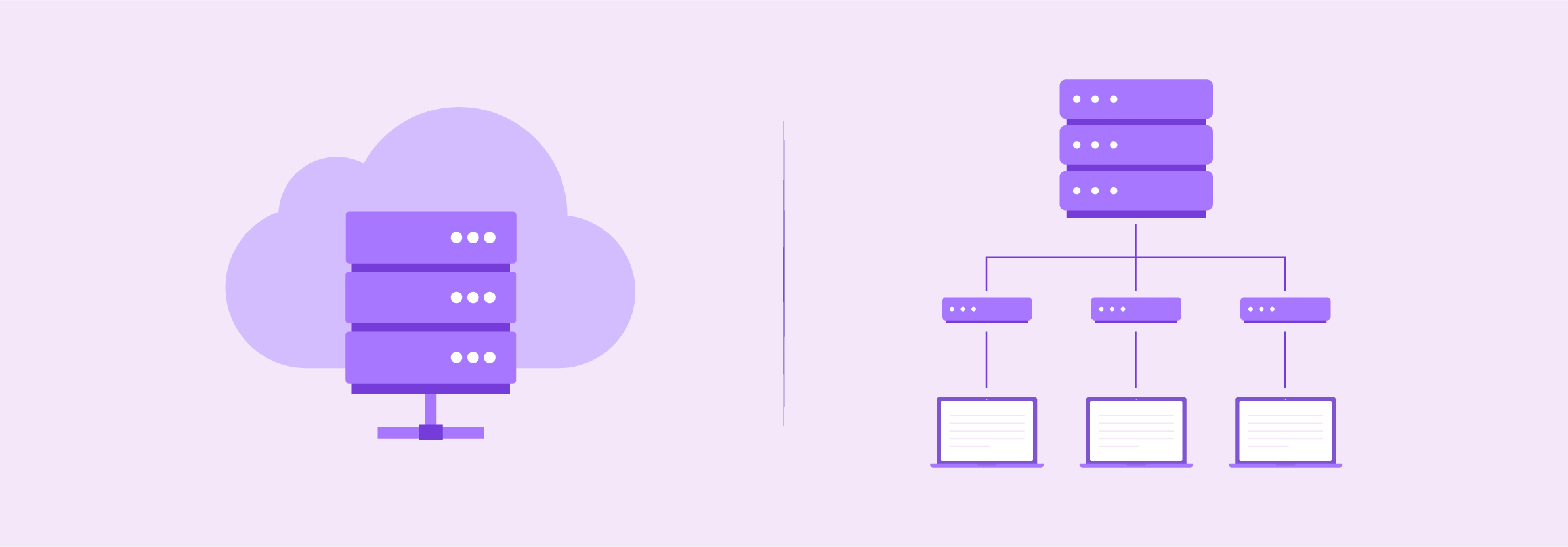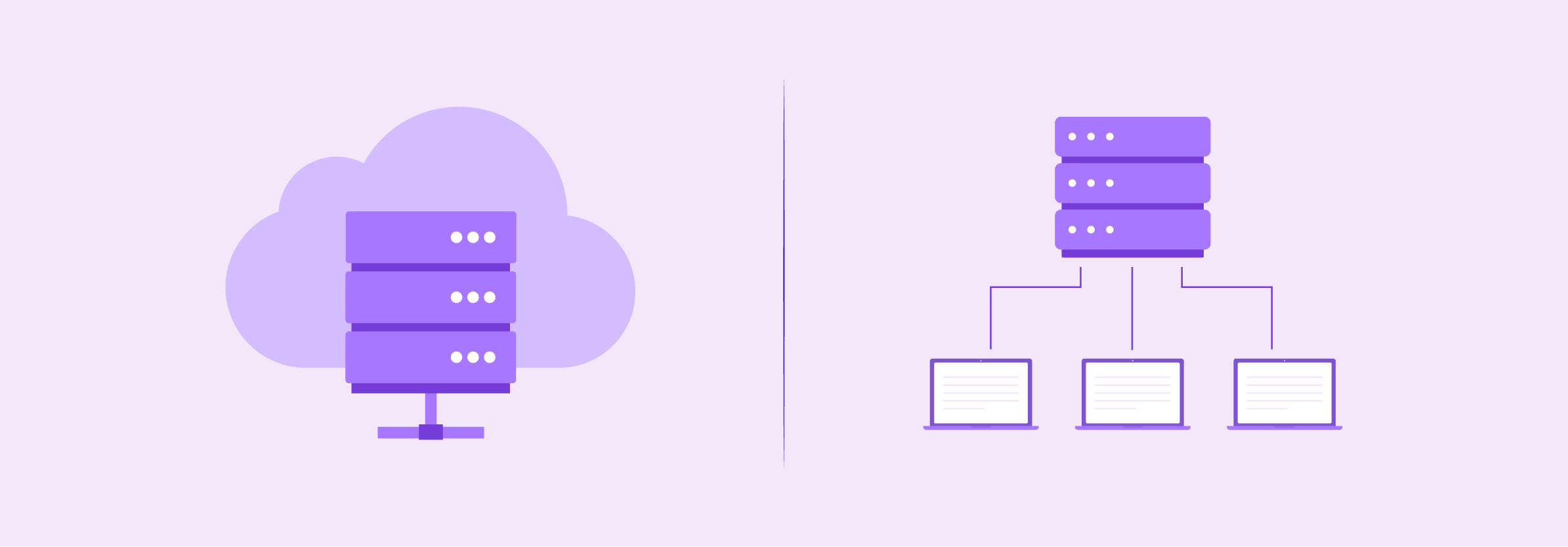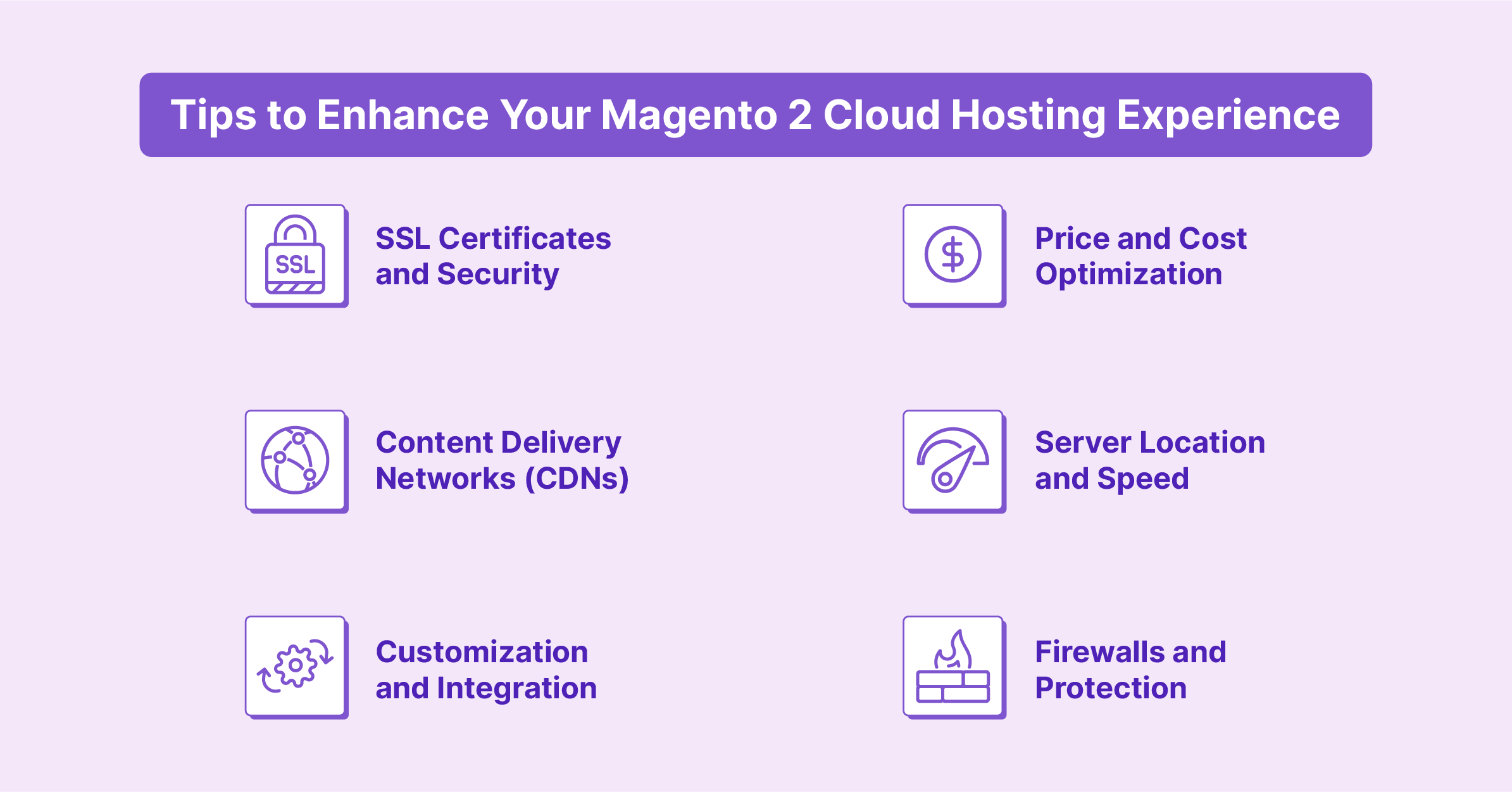
Magento 2 Cloud Hosting: Shared vs. VPS Hosting
Magento 2 Cloud Hosting employs virtualization technology, distributing resources across multiple servers to establish a scalable hosting environment. It bears similarities to VPS hosting, with a few key differences. This guide explores Magento 2 cloud hosting, highlighting its distinctions between shared, dedicated, and VPS hosting options. It will help you make informed hosting decisions for your Magento 2 store.
Key Takeaways
-
Discover the reliability and accessibility benefits of Magento 2 Cloud Hosting.
-
Explore how performance optimization features like CDNs and caching mechanisms contribute to faster loading times, enhancing the overall user experience.
-
Differentiate between Magento Cloud Hosting and VPS hosting, understanding key factors such as scalability, performance, pricing, and reliability.
-
Explore the scalability, performance, pricing, and reliability differences between Magento Cloud and Shared Hosting.
-
Optimize your Magento 2 Cloud Hosting experience by implementing SSL certificates, server monitoring, and other strategies for enhanced security, customization, and performance.
What is Magento Cloud Hosting?

Magento Cloud hosting uses multiple interconnected servers across different locations. It spreads your data across virtual servers, improving customer service. It easily adjusts CPU, RAM, and storage resources for varying workloads, ensuring peak website or app performance.
Magento websites remain accessible from anywhere since all cloud servers have duplicated resources. Traffic is smoothly rerouted if one server gets crowded. Equal resource allocation among cloud servers ensures reliability. If one server fails, it won't disrupt the entire service, maintaining continuous high performance.
Magento Cloud Hosting stands out with its pre-configured infrastructure, automatic scaling capabilities, and integrated features. This hosting option proves invaluable, especially for businesses experiencing fluctuating traffic patterns, eliminating the need for manual server management, updates, and scaling.
Benefits of Magento 2 Cloud Hosting
-
Reliability: Cloud hosting ensures your Magento website's reliability by distributing it across multiple physical networks. Even if one server encounters issues or undergoes maintenance, your website's accessibility remains intact. It means your customers can shop without disruptions, enhancing their trust and satisfaction.
-
Security: With Magento 2 Cloud Hosting, your online store is shielded by several physical servers. This protective layer safeguards your website against external threats and potential service interruptions. It is essential for maintaining the confidentiality of customer data and the uninterrupted operation of your e-commerce platform.
-
Scalability: Cloud hosting offers high Magento scalability, accommodating your Magento store's evolving resource needs. Unlike traditional hosting, which may have fixed limitations, cloud resources are readily available and adjustable in real time. This flexibility ensures your website can handle increased traffic during busy periods, such as holidays or sales events.
-
Cost-Efficiency: Cloud hosting is cost-effective because you only pay for the resources you use. It eliminates the need for large upfront investments in hardware and provides predictable pricing. For businesses, this cost-effectiveness means you can allocate your budget more efficiently, focusing on growth initiatives.
-
High Availability: Ensuring high availability is vital for e-commerce. Magento 2 Cloud Hosting maintains your website's accessibility during server maintenance or unexpected Magento downtime. This constant availability minimizes the risk of revenue loss due to inaccessible online stores.
-
24/7 Support: The availability of round-the-clock customer support from cloud hosting providers is invaluable. It ensures you can seek assistance anytime for technical concerns or general inquiries. This continuous support guarantees that your online store remains operational and responsive to customer needs at all hours.
Cloud vs. VPS Hosting: Key Comparison

1. Scalability
Cloud Scalability: Cloud hosting offers exceptional scalability for your Magento website. Its inherent flexibility allows you to increase your resources as the need arises effortlessly. With cloud hosting, you can swiftly upgrade your server to 8GB, 12GB, or more within minutes. It means your website remains highly responsive, and you can avoid Magento downtime or crashes resulting from resource constraints.
VPS Scalability: On the other hand, VPS hosting has limitations when it comes to scalability. While you can select your initial resource size when setting up your VPS server, expanding those resources later becomes more complex. This process may require temporarily taking your website offline and often involves seeking expert assistance.
2. Performance
Cloud Performance: Cloud hosting delivers enhanced Magento performance due to its robust server infrastructure. With cloud hosting, your data isn't reliant on a single server. It benefits from a more efficient content distribution system, resulting in remarkable data delivery speeds. Moreover, the high scalability options guarantee that your site won't suffer resource shortages, leading to improved Magento uptime statistics.
VPS Performance: While VPS hosting can offer satisfactory performance, it is closely tied to a single server. Performance may suffer if the server faces resource constraints. If the server experiences downtime, your site will also go offline since there are no backup resources to rely on.
3. Pricing
Cloud Pricing: The pricing for cloud hosting typically falls within the range of $10 to $100, contingent on the specific requirements of your website.
Note: Cloud hosting pricing can be variable, mainly dependent on your site's fluctuating resource demand.
VPS Pricing: VPS hosting also has a pricing range of $10 to $100, with the possibility of finding options that cost less than $10. However, what sets VPS hosting apart is that its pricing is generally fixed every month. Scaling up resources on demand is not straightforward, unlike cloud hosting.
4. Flexibility
Cloud Flexibility: Cloud hosting provides solid flexibility regarding resource management. You can allocate or de-allocate resources within minutes, allowing you to pay only for the resources you utilize. It means you pay according to your actual resource consumption. This level of flexibility is achievable because the infrastructure is not concentrated in a single location.
VPS Flexibility: VPS hosting offers different flexibility focused on customizations. Users can manually fine-tune various server settings to meet their specific requirements. However, these customizations can be time-consuming and may require substantial technical resources.
5. Reliability
Cloud Reliability: The cloud hosting infrastructure is designed for high reliability. Back-up resources are readily available to keep your sites and software running smoothly even in a component failure. This infrastructure setup often leads cloud server providers to claim 99.99% uptime for their users proudly.
VPS Reliability: VPS hosting, while generally reliable, falls slightly short when compared to the reliability of cloud hosting. It is because its dependency lies on a single server. The site experiences downtime until the hosting provider resolves the server-related problems.
6. Security
Cloud Security: Cloud hosting employs a data distribution model that spans multiple servers and nodes. While this distribution exposes data to greater risk, cloud providers implement multiple security measures to ensure data integrity and confidentiality.
These measures typically include firewall systems and data encryption. Users can also further enhance security with their security measures. With these precautions in place, cloud hosting is generally considered sufficiently secure.
VPS Security: VPS hosting, by design, offers a higher degree of security due to the concentration of data in one location. The centralized data storage simplifies management and control. However, users of VPS hosting should still implement additional security measures, such as using a VPN for Windows, to strengthen their sites against potential cyber threats.
7. Support
Cloud Support: Cloud hosting platforms require less hands-on maintenance because the hosting providers manage most server-side operations. As a result, technical expertise is less of a necessity for routine operations. Nonetheless, most cloud hosting providers offer reliable customer support services.
VPS Support: Managing a VPS requires more technical support than cloud hosting. It implies that you may need technical assistance at various points in time. VPS hosting requires more manual maintenance in comparison to cloud hosting. While some users view this as an opportunity to have complete control over their site's operations, others may see it as a hassle.
Note: Evaluate the quality of support your chosen VPS service provider offers before deciding.
8. Data Centers
Cloud data centers: Cloud hosting providers often operate a network of geographically distributed data centers. This global presence allows Magento Cloud Hosting to offer redundancy and high availability by replicating your website's data and resources across multiple data centers.
VPS data centers: VPS hosting typically relies on a single data center location. Your virtual private server is hosted within this facility. Your website's performance and availability depend on the reliability of that specific data center. They may not offer the same redundancy and failover capabilities as cloud hosting's distributed data center network. As a result, VPS hosting may be more susceptible to localized outages or disruptions.
Cloud vs. Shared Hosting: Key Comparison

1. Scalability
Cloud Hosting Scalability: Regarding scalability, Magento Cloud Hosting offers impressive flexibility. You can effortlessly expand your resources to meet the growing demands of your online store. You can quickly allocate additional resources if your Magento website experiences a sudden visitor surge due to a special promotion or seasonal event.
Shared Hosting Scalability: In contrast, scalability with Magento Shared Hosting is limited. Your resource allocation is predefined and shared among multiple websites on the same server. It means that if you need to accommodate increased traffic or resource demands, your options are constrained by the limitations set by the hosting provider. Scaling up may not be as straightforward and requires upgrading to a different hosting plan.
2. Performance
Cloud Hosting Performance: Magento Cloud Hosting benefits from the redundancy and load-balancing features of cloud infrastructure. It leads to more consistent and stable performance. Websites hosted in the cloud are less likely to experience performance degradation during traffic spikes.
Shared Hosting Performance: Magento Shared Hosting offers reasonable performance for smaller websites with limited resource demands. However, performance can become inconsistent since resources are shared among multiple websites on the same server. If other websites on the server experience high traffic or resource usage, it can impact the performance of your Magento site. It leads to slower page loading times and reduced user satisfaction.
3. Pricing
Cloud Hosting Pricing: Pricing for Magento Cloud Hosting typically falls from $10 to $100 per month, depending on your specific requirements and the hosting provider you choose. It's essential to note that cloud hosting pricing can be variable, influenced by factors such as your website's resource demands and fluctuations in usage.
Shared Hosting Pricing: Magento Shared Hosting is generally budget-friendly, typically ranging from $2 to $15 monthly. This affordability makes it an attractive option for smaller businesses or those with limited hosting budgets.
Note: it's important to consider the trade-off between lower costs and potential limitations in performance and scalability.
4. Flexibility
Cloud Hosting Flexibility: Magento Cloud Hosting offers a high degree of flexibility in resource management. You can easily adjust your resources, whether increasing server capacity during peak shopping seasons or reducing it during quieter periods. This pay-as-you-go model ensures that you only pay for the resources you use, making it a cost-effective choice.
Shared Hosting Flexibility: Flexibility in resource allocation is limited with Magento Shared Hosting. You must work within the predefined resource limits set by the hosting provider. The lack of flexibility can be a drawback if your website experiences sudden changes in traffic or resource demands.
5. Reliability
Cloud Hosting Reliability: Magento Cloud Hosting offers high reliability due to its distributed infrastructure. In the event of hardware failures or server issues, automatic failover mechanisms ensure minimal downtime and disruption.
Shared Hosting Reliability: While shared hosting can be reliable for smaller websites with moderate traffic, it may not offer the same level of reliability as cloud hosting. Since multiple websites share the same server resources, issues or resource constraints on one website can affect others. It leads to occasional downtime and performance hiccups.
6. Security
Cloud Hosting Security: Magento Cloud Hosting providers typically implement advanced security measures, such as intrusion detection systems and regular security audits. They also offer features like isolated virtual private clouds (VPCs) for enhanced security.
Shared Hosting Security: Shared hosting also maintains security measures, but the shared environment introduces some security considerations. The presence of multiple websites on the same server means that the security of one website can impact others. Users of shared hosting should remain vigilant about website security practices.
7. Support
Cloud Hosting Support: Cloud hosting platforms typically require less hands-on management, as the Magento hosting provider manages many server-side tasks. It often results in a reduced need for technical expertise for routine operations. Most cloud hosting providers offer customer support, which is available 24/7. Additional premium support options may also be available for those seeking dedicated assistance.
Shared Hosting Support: Most shared hosting only provides ticket support with 8 to 24 hours of reply time. Managing a Magento website on shared hosting may require more technical support, especially if issues arise due to the shared server environment. Users should be prepared for occasional technical challenges and assess the quality of support their shared hosting provider offers before deciding.
8. Storage Limit
Cloud Hosting Storage: With Magento Cloud Hosting, you can often scale your storage capacity based on your specific requirements. You can easily expand your storage as your online store grows, accommodating a larger product catalog, media files, and customer data. Cloud hosting's scalable storage options ensure you're not constrained by fixed storage limits, allowing your website to adapt to changing needs.
Shared Hosting Storage: Shared hosting plans often come with fixed storage limits determined by the hosting provider. These limits ensure fair resource allocation among all websites on the shared server. It may become restrictive as your business and data storage requirements expand. If your online store's storage demands increase significantly, consider upgrading to a hosting solution with higher storage capacity.
Tips to Enhance Your Magento 2 Cloud Hosting Experience

When considering Magento 2 Cloud Hosting for your e-commerce platform, explore various aspects beyond the fundamental hosting infrastructure. It includes:
-
SSL Certificates and Security: Prioritize the deployment of SSL certificates to secure your customer’s sensitive data during online transactions. Invest in security patches and monitoring solutions to protect against vulnerabilities and DDoS attacks.
-
Content Delivery Networks (CDNs): Integrate a CDN to enhance your website's performance by distributing content across multiple server locations. It ensures faster page loading times and an improved shopping experience for your visitors, regardless of geographical location.
-
Customization and Integration: Leverage the flexibility of Magento 2 Cloud Hosting to customize your e-commerce site to meet your specific business needs. Explore various plugins, extensions, and development tools to enhance functionality and user experience.
-
Price and Cost Optimization: Keep an eye on your hosting expenses and evaluate different hosting packages and providers. Consider factors such as bandwidth, storage, and server configurations to find the most cost-effective solution for your business.
-
Server Location and Speed: The server's physical location can significantly impact your website's speed and performance. Choose a hosting company with server locations that align with your target audience's location for faster loading times.
-
Firewalls and Protection: Implement firewalls and security features to safeguard your online store from potential cyber threats and attacks. Regularly monitor your hosting environment for any suspicious activities.
FAQs
1. How does SSL certificate deployment benefit my Magento 2 Cloud Hosting?
SSL certificates secure sensitive customer data during online transactions, ensuring a safe and trustworthy shopping experience. They encrypt communication between the user's browser and the server, enhancing the overall security of your e-commerce platform.
2. Can I integrate server monitoring for my Magento store on Cloud Hosting?
Certainly, implementing server monitoring enhances the reliability of your online store. It allows your team to identify and address potential issues proactively. It ensures continuous high Magento performance and minimizes downtime for a seamless shopping experience.
3. How can developers leverage Magento 2 Cloud Hosting for customization?
Magento 2 Cloud Hosting provides a flexible environment for developers to customize your ecommerce site. They can explore various plugins, extensions, and development tools to enhance functionality and user experience, aligning the platform with business needs.
4. What scalability options does Magento 2 Cloud Hosting offer for products and traffic spikes?
Magento 2 Cloud Hosting offers exceptional scalability. You can effortlessly expand resources to accommodate a growing product catalog and handle sudden traffic spikes. It ensures your website remains responsive and capable of meeting evolving demands.
5. How can I check the version compatibility of Magento with the chosen web hosting?
Ensure that your chosen web hosting provider supports the Magento version you are using for your ecommerce platform. It ensures a smooth and reliable performance, avoiding potential compatibility issues that might impact your online store.
Summary
Magento 2 hosting solution ensures unparalleled scalability and security for your Magento store, elevating its performance and reliability. This guide covered Magento 2 Cloud Hosting benefits over shared and VPS hosting options regarding reliability, security, scalability, etc.
Elevate your Magento server hosting experience by exploring the advanced features of Magento 2 Cloud Hosting.


